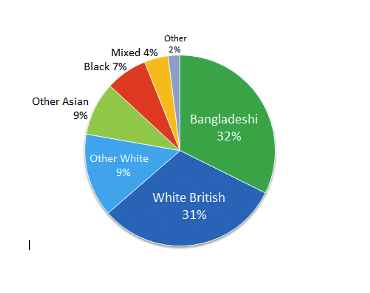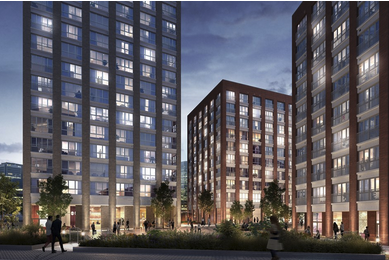Gentrification describes the transformation of a working-class neighbourhood into a middle class one. The process includes the construction of new apartment complexes and shopping areas, which then leads to higher of living costs that typically displace many of the current inhabitants in the process.
The Blackwall Reach development by The Swan Housing Association in Tower Hamlets will eventually include 1,500 new homes of which around half, according to their website “…will be affordable for social rent and shared ownership.”
This regeneration will cost £500 million, with the inclusion of a cafe, gym and three acres of green space. The development will turn the area into one of the biggest new ‘villages’ in London.
But Tower Hamlets currently has high levels of poverty. According to this Trust For London page, 53% of the area’s children are living in poverty compared to 35% in London as a whole. And this Tower Hamlets Research Briefing shows that by 2013 over half of the population was made up of minority groups, mostly on low income.
 The gentrification represented by the Blackwall Reach development will bring more opportunities, wealth and incentives to the area, but for who? It is likely that many from the poorer communities within the area who can’t afford the new living costs will find themselves forced out. The evictions that we associate with this process won’t begin immediately, but will happen gradually over time, affecting mainly those who are already struggling to get by.
The gentrification represented by the Blackwall Reach development will bring more opportunities, wealth and incentives to the area, but for who? It is likely that many from the poorer communities within the area who can’t afford the new living costs will find themselves forced out. The evictions that we associate with this process won’t begin immediately, but will happen gradually over time, affecting mainly those who are already struggling to get by.
The negative effects of gentrification have been studied over time. Back in 2015 for example this Independent article reported that gentrification had pushed the average cost of a London house up to “…more than half a million pounds”.
The Tower Hamlets Poverty Review published this September shows that increases in rent and other living costs have meant that poverty within the area has risen 28%, which is more than in any other part of London. Gentrification may also affect smaller locally-owned businesses unable to pay the increased rates that gentrification usually brings along with it, which in turn will contribute to unemployment and poverty.
So, to ensure that the current residents and businesses of Tower Hamlets can feel secure about being able to stay where they are now, rent controls should be introduced. Forums through which the community can be consulted should also be organised so that all parties can come together to work out the most suitable options.
Change might be inevitable, but unfortunately making sure that it benefits all equally is not. Local and central government therefore need to step in – in order to make sure that ‘change’ does not stand in the way of achieving an equitable society.

